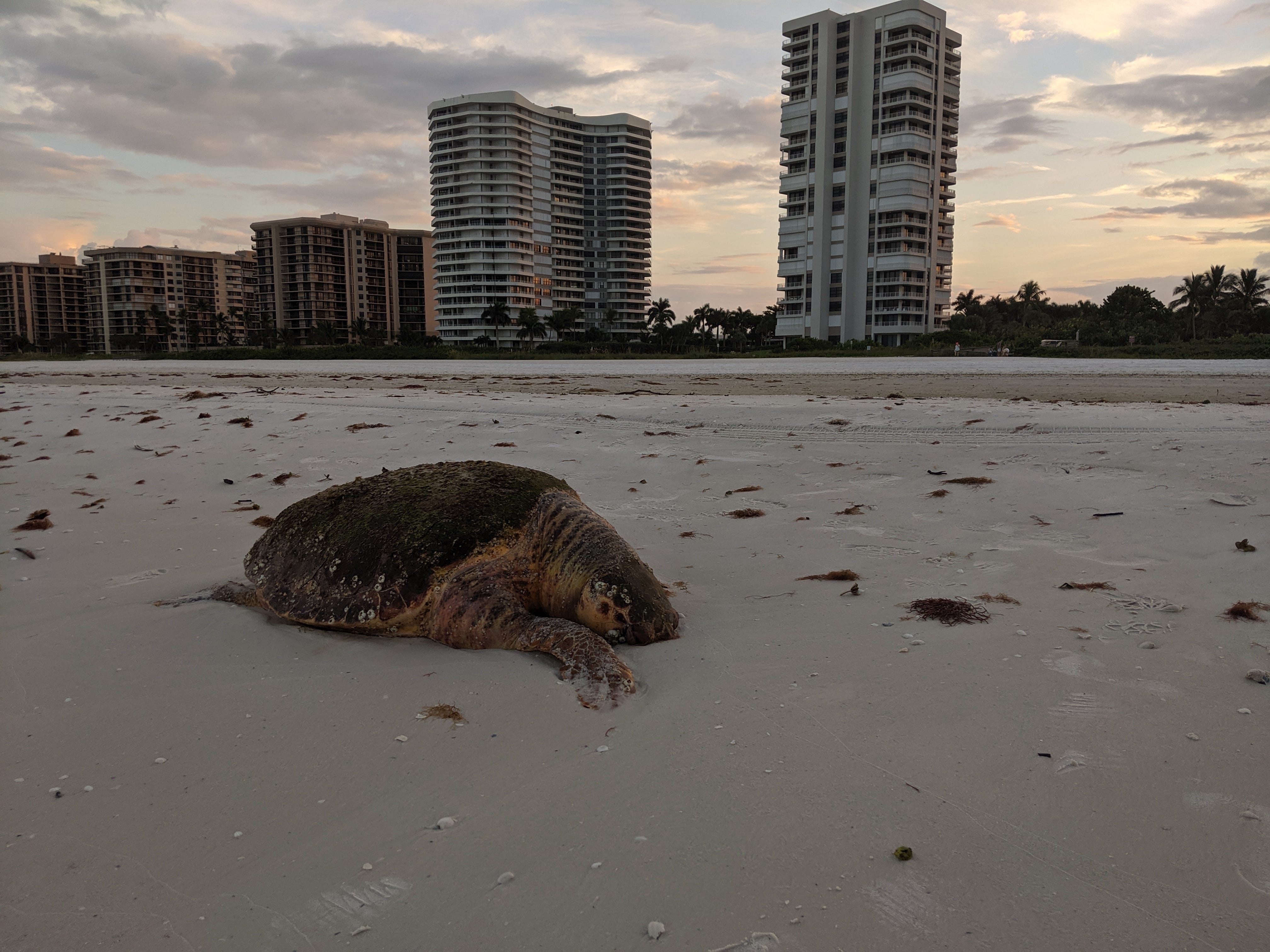Six sea turtles found dead on Marco Island, red tide likely the culprit, county says
 Omar Rodríguez Ortiz
Omar Rodríguez Ortiz
In the span of two days, six dead sea turtles were found washed ashore on Marco Island and red tide is the likely culprit, according to a Collier County official.
Five Kemp's ridley sea turtles were found dead on Wednesday and a dead loggerhead was found Thursday on Marco's beaches, according to Maura Kraus, principal environmental specialist for Collier County.
"Red tide is off shore and gets concentrated in their food source such as crabs and mollusks and sometimes sponges," Kraus wrote to the Eagle. "It usually takes a couple of weeks to filter out of their food after the red tide is gone."
Katherine Ebaugh, a former Marco Island resident, said she saw a 200 pound dead loggerhead turtle that washed ashore behind the Madeira condominium, close to the JW Marriott Beach Resort, on Thursday morning.
"It had no visible propeller marks," Ebaugh said in a phone call to the Marco Eagle.
Joanna D. Metzger, a Marco Island resident, said she saw the dead loggerhead turtle upside down during her morning walk. Metzger also said the turtle had no propeller marks.
"It is very distressing especially after what we witnessed in 2018," Metzger said, referring to last year's red tide. "I feel nothing has really changed in terms of water quality and management."
In a phone call to the Eagle, Metzger said it is good that many people got to see the dead turtle even if it is difficult to watch.
"That way people will get upset and make some noise so our government will make more changes," Metzger said.
Metzger said she also saw a dead cormorant further down the beach.
In case you missed it:Dozens of fish, sea turtle found dead on Marco Island as red tide threat grows
The Eagle reported dozens of dead fish washed ashore Oct. 9 on Marco Island's South Beach.
"These fish kills are likely due to red tide," a spokesperson for FWC wrote in an email to the Eagle at the time. "There are high concentrations in the area."
The Eagle reported on Oct. 16 dead fish and respiratory irritation were registered at Naples beaches
The News-Press reported on Oct. 17 a red tide bloom has made its way into Southwest Florida bays and is killing larger marine life like the sea turtles found on Marco.
More:Lingering red tide gaining strength, killing sea turtles and moving into local bays
And:Dead fish and respiratory irritation reported at Naples beaches, report says
Kraus said 49 sea turtles have been found dead or in distress this year on Collier's coast.
"We average about 30 per year," Kraus said.
Kraus said 133 sea turtles were found dead or in distress last year, many due to red tide.
The turtle deaths are devastating, according to Colleen Gill, a local activist and South Naples resident.
"We (Florida) were just celebrating an excellent nesting season, which was so exciting after seeing such a massive loss of life during the last red tide event," Colleen wrote to the Eagle. "And now to be seeing the dead turtles again is just heartbreaking."
"We need to protect our environment because that is the reason many of us decided to move here," Ebaugh wrote.
Facts about red tide
- A red tide, or harmful algal bloom, is a higher-than-normal concentration of a microscopic alga (plantlike organism), according to the FWC website.
- At high enough concentrations, red tide can discolor water a red or brown hue. The water can also remain its normal color during a bloom.
- Red tides were documented in the southern Gulf of Mexico as far back as the 1700s and along Florida's Gulf coast in the 1840s. Fish kills near Tampa Bay were even mentioned in the records of Spanish explorers.
- Red tides in Florida develop 10-40 miles offshore, away from man-made nutrient sources.
- There is no direct link between nutrient pollution and the frequency or initiation of red tides caused by Karenia brevis. However, once red tides are transported inshore, they are capable of using man-made nutrients for their growth.
- No single factor causes blooms of Karenia brevis.
Source: https://myfwc.com/research/redtide/faq